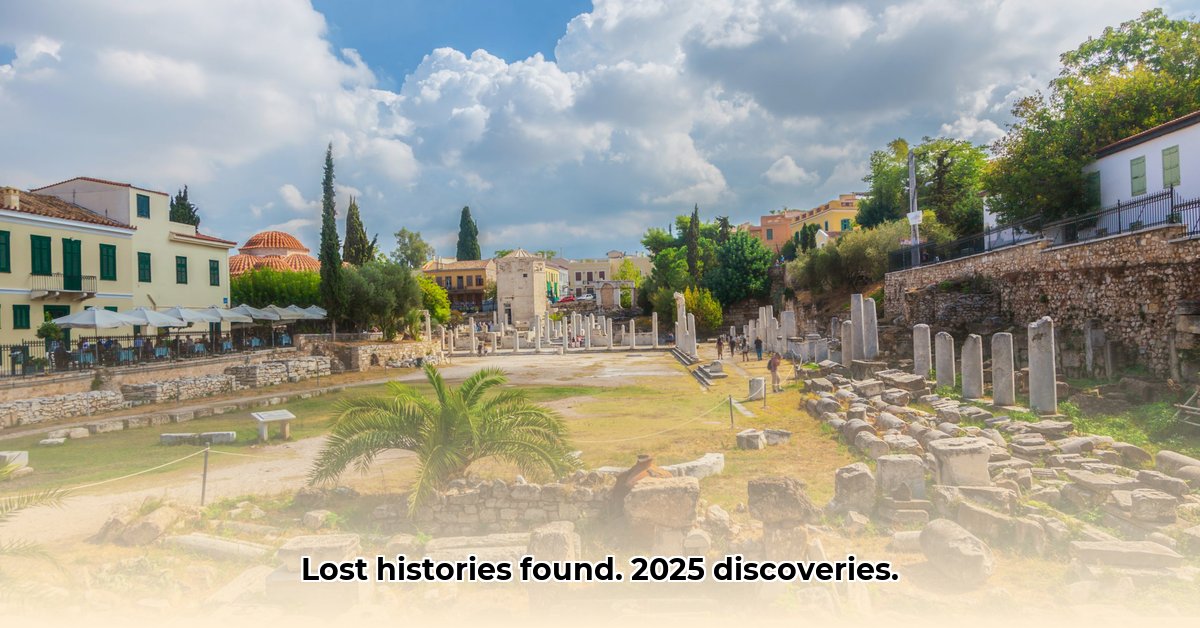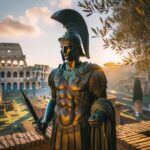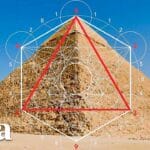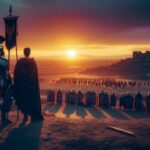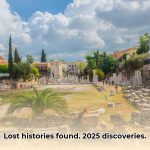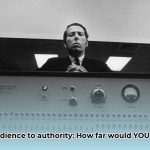Ever wondered what life was really like in ancient Rome, or how the Egyptians built those amazing pyramids? Ancient history isn’t just dusty old textbooks—it’s a thrilling adventure story filled with incredible people, dramatic events, and surprising twists. But with so many books out there, it can be tough to know where to start. This guide cuts through the clutter, giving you a curated list of the best ancient history books, categorized to match your interests and reading level. We’ll cover everything from groundbreaking discoveries that rewrite the history books to the ongoing debates that shape our understanding of the past. To learn more about significant historical libraries, check out this article on the Library of Alexandria. Get ready to explore a world of fascinating stories and learn how to think critically about what you read!
Ancient History Books: New Perspectives on the Past
Delve into the captivating realm of ancient history! Recent years have witnessed a notable surge in interest, spurred by groundbreaking discoveries and a rejuvenated viewpoint on the past that invites us to explore early civilizations. Gone are the days of history books solely focused on kings and battles. We now have access to nuanced stories, bringing to light previously unheard voices and perspectives from all walks of life in ancient civilizations. This means that the books we read today offer a richer, more complete, and more human picture of the past than ever before, offering a more holistic examination of various facets of ancient societies.
Unearthing the Classics: Exploring Ancient Civilizations
Let’s embark on our journey geographically, and examine ancient cultures. Imagine strolling through the bustling streets of ancient Rome! Several fantastic books provide vivid glimpses into daily Roman life. Mary Beard’s “SPQR: A History of Ancient Rome” provides an engaging and deeply informative look, making the ancient world come alive. Want to explore the mysteries of ancient Egypt? Countless books delve into the pharaohs, their magnificent tombs, and the fascinating beliefs of this incredible civilization. “The Rise and Fall of Ancient Egypt” by Toby Wilkinson gives a broad sweep across millennia. Similarly, you can choose from a number of insightful works that illuminate ancient Greece: from its legendary myths and dramas to its political innovations and philosophical giants. Don’t forget Mesopotamia, the “cradle of civilization,” whose story is just as rich and full of intrigue. “Babylon: Mesopotamia and the Birth of Civilization” by Paul Kriwaczek is an excellent starting point. The sheer diversity of available books is mind-boggling!
Beyond Geography: Thematic Journeys Through Time
Instead of just looking at locations, we can also approach ancient history through key topics or themes, focusing on ancient societies. If you’re a military history enthusiast, prepare to be enthralled by detailed accounts of ancient warfare, strategies, and the incredible feats of generals like Alexander the Great. “By the Spear: Philip II, Alexander the Great, and the Rise and Fall of the Macedonian Empire” by Ian Worthington offers a compelling look at this era. Alternatively, perhaps you’re more interested in the lives of ordinary people? Then look for books that focus on social history, offering glimpses into family structures, daily routines, and economics. “Daily Life in Ancient Rome” by Alberto Angela is a great choice. It’s amazing how many details have been pieced together to reconstruct the daily lives of people thousands of years ago! There’s also fascinating political history that shows us how ancient governments worked (or didn’t). Many books examine the power struggles and governance of different ancient societies. Additionally, a growing number of books are correcting the past by accurately portraying the significant roles women played in antiquity; their stories are no longer just footnotes but central narratives that offer deeper insight on ancient civilizations. “Cleopatra: A Life” by Stacy Schiff offers a nuanced look at the life and times of one of history’s most fascinating female rulers.
Finding Your Perfect Ancient History Read
The wonderful thing about ancient history books is their variety! There’s something for every reader, regardless of their experience or interests in historical analysis. For those just beginning their exploration, many accessible introductions to ancient civilizations exist. “Ancient History: A Very Short Introduction” by Philip de Souza offers a great starting point. For seasoned history buffs or experts, there are numerous specialized studies and scholarly works offering advanced analyses and engaging debates. Students will find invaluable resources to help with their studies, from introductory texts to detailed scholarly monographs. If you’re more of a casual reader, lots of books bridge the gap between academic precision and captivating storytelling. The key is to find a book that matches your reading level and the depth of information you’re seeking.
Different Approaches, Different Stories
The way historians write about the past has changed immensely. Traditionally, books often concentrated on the actions of powerful leaders, portraying epic battles and grand political schemes and focusing on historical perspectives. While these narratives are still relevant and important, many newer books offer a different perspective. Some books attempt to offer a more balanced history, incorporating the stories of ordinary people and diverse social groups; the experiences of women, slaves, and the common people are now routinely being researched and discussed. Some historians even use interdisciplinary approaches, combining insights from archaeology, anthropology, and linguistics to paint a much richer image of the past. These books often bring to light completely new ways of understanding ancient societies. “The Ancient Near East: History, Society and Economy” by Mario Liverani combines history, society and economy. The most important thing to remember as a reader is that even the most renowned books should be examined critically and consider research methodologies. Always bear in mind that the historical record is incomplete, and the biases of different sources need to be considered. Different scholars may interpret the same evidence in radically different ways, highlighting the ongoing evolution of our understanding of the past.
A Glimpse into Some Remarkable Ancient History Books
Below is a small selection of examples illustrating the diversity of books available. Remember this is not an exhaustive list — many other excellent books exist!
| Category | Title Example | Author Example | Strengths | Potential Weaknesses |
|---|---|---|---|---|
| Roman Empire (Beginner) | SPQR: A History of Ancient Rome | Mary Beard | Introduces fundamental aspects of Roman history. | May oversimplify complex topics for brevity. |
| Ancient Greece (Advanced) | The Landmark Thucydides: A Comprehensive Guide to the Peloponnesian War | Robert B. Strassler (Editor) | Primary source; provides in-depth analysis. | Potentially biased perspective from Thucydides. |
| Social History (All Levels) | Women in Antiquity | Sarah Pomeroy | Focuses on the diverse experiences of women. | Scope may be vast, requiring focused reading. |
| Military History (Intermediate) | The Art of War | Sun Tzu | Classic military strategy text; still relevant today. | Requires interpretation and contextualization. |
| Daily Life (Beginner) | Life in Ancient Egypt | Eugen Strouhal | Illustrates the day-to-day experiences of ordinary Egyptians. | Level of detail may not cover all aspects. |
Remember, the best ancient history books are those that not only inform but also inspire wonder and a deeper appreciation for the past. They encourage us to constantly question, interpret, and reassess what we think we know. Happy reading – and happy exploring!
How to Reconcile Conflicting Interpretations of Ancient Historical Events
Have you ever considered historical interpretation and the challenges within?
Key Takeaways:
- Ancient history is a puzzle with missing pieces. We must learn to work with incomplete data.
- Multiple perspectives are crucial; there’s rarely one “right” answer, emphasizing interpret historical events.
- Understanding the biases of both ancient authors and modern historians is key.
- How to reconcile conflicting interpretations of ancient historical events involves careful source analysis and critical thinking.
- New discoveries constantly reshape our understanding, allowing a better historical context.
Navigating the Labyrinth of Ancient Histories
Have you ever felt overwhelmed by the sheer number of conflicting accounts of ancient events? You’re not alone. Ancient history relies on fragmented evidence, biased accounts, and differing interpretations. So, how to reconcile conflicting interpretations of ancient historical events? It’s a skill we all need to develop.
Think of it like assembling a jigsaw puzzle with missing pieces and some damaged ones. Each “piece” is a historical source–a fragment of pottery, a faded inscription, a biased chronicle. Historians painstakingly put these pieces together, but often there are gaps and ambiguities.
Different Lenses, Different Stories
One of the most challenging aspects is that different historians bring different lenses – different backgrounds, methodologies, and interpretations—to the same source material. A historian focused on social structures might interpret an ancient text very differently from a historian specializing in military campaigns. This isn’t necessarily a problem; it’s a sign of a vibrant, evolving field that helps with historical scholarship.
Steps to Critical Evaluation
To navigate these complexities, we need a systematic approach:
-
Source Criticism: Identify the source’s origin, author, intended audience, and potential biases. Was it written to glorify a ruler? To persuade a certain group? Understanding these factors is essential for context.
-
Comparative Analysis: Don’t rely on a single source. Compare accounts from different sources, even if they contradict each other. Look for corroborating evidence or points of divergence and the use of historical evidence.
-
Contextualization: Ancient events didn’t happen in a vacuum. Consider the broader social, political, and economic context. How might these factors influence the narrative?
-
Embrace Ambiguity: Sometimes, we simply don’t have enough information to reach a definitive conclusion. Learning to accept uncertainty is part of the process.
Examples from Recent Scholarship
Consider the ongoing debate about the causes of the Roman Empire’s decline. Peter Heather in “The Fall of the Roman Empire: A New History of Rome and the Barbarians” emphasizes barbarian invasions, while Bryan Ward-Perkins in “The Fall of Rome: And the End of Civilization” focuses on internal factors. The truth, likely, is a complex interplay of all these elements.
Similarly, interpretations of ancient Egyptian society have shifted dramatically in recent decades, with renewed attention to the roles of women and marginalized groups. These shifts highlight the importance of incorporating diverse voices and perspectives.
Recommended Resources (for further exploration):
A helpful overview of methodological approaches in ancient history
By learning to navigate the diverse and sometimes conflicting narratives, we gain a deeper and more nuanced understanding of the past. This journey of critical evaluation and synthesis, however challenging, is ultimately rewarding and allows for a look into ancient world history.
Ancient History Unveiled: Exploring Untold Stories & Forgotten Civilizations
Do new discoveries challenge our perspectives on cultural heritage?
Key Takeaways:
- Ancient DNA analysis is revolutionizing our understanding of past populations, challenging long-held assumptions.
- A multidisciplinary approach—combining archaeology, genetics, and inclusive historical narratives—is essential for uncovering untold stories.
- Ethical considerations surrounding the use of ancient remains and the representation of marginalized cultures are paramount.
- New technologies are transforming how we access and interpret historical data, which involves archaeological discoveries.
Unearthing Hidden Histories Through Ancient DNA
Imagine peering into the past, not just through dusty scrolls and crumbling ruins, but through the very genetic code of our ancestors. Ancient DNA (aDNA) is doing just that, revealing hidden migrations, unforeseen cultural exchanges, and the remarkable adaptability of ancient humans. It’s transforming Ancient History Unveiled: Exploring Untold Stories & Forgotten Civilizations. The recent surge in aDNA studies has challenged established narratives, prompting us to reconsider the origins and evolution of numerous societies. Think of it as unlocking a genetic time capsule—fascinating, isn’t it?
But aDNA isn’t a magic bullet. Its limitations—degradation, biased sampling, and ethical considerations—require careful interpretation and the use of genetic research. We must balance the scientific pursuit of knowledge with the ethical treatment of human remains and the sensitivity towards descendant communities.
Rethinking Narratives: A Multidisciplinary Approach
For years, ancient history relied heavily on written records. These records, however, often reflected the perspectives of the powerful, silencing the voices of the marginalized. But what if we could hear those unheard voices? Archaeological discoveries, alongside aDNA, and digital technologies are now offering alternative perspectives. The study of everyday life, focusing on material culture, social structures, and even nutrition, is giving us a more holistic view of the past and cultural dynamics. This is a core principle of Ancient History Unveiled: Exploring Untold Stories & Forgotten Civilizations. It’s not just about kings and queens anymore – it’s about everyone.
Several recent works explore these themes masterfully. “The Dawn of Everything: A New History of Humanity” by David Graeber and David Wengrow challenges traditional narratives of social evolution. These books highlight the importance of inclusivity and challenge us to critically evaluate our sources.
The Role of Technology
Technology is another key player, offering valuable digital resources. Advanced imaging techniques, digital archives, and sophisticated data analysis methods are revolutionizing how we approach ancient history. We now have tools that were unimaginable just a few decades ago. Imagine effortlessly analyzing vast quantities of archaeological data, creating 3D models of ancient sites, or even digitally reconstructing ancient languages. These advances make the study of ancient history more accessible and exciting than ever before. They are vital to the mission of Ancient History Unveiled: Exploring Untold Stories & Forgotten Civilizations.
How can we preserve ancient history?
However, technology alone isn’t enough. It must be combined with rigorous historical methodology and ethical consideration. As we delve deeper into the past through these technological innovations, we must remain mindful of the potential pitfalls of bias and misinterpretation.
Ethical Considerations and the Future of Ancient History
The ethical responsibilities of researchers are paramount. We must be sensitive to the cultural heritage of communities whose ancestors are the subject of our research. Collaboration with Indigenous communities and descendant groups is crucial in respectful and ethical practice. It is vital in Ancient History Unveiled: Exploring Untold Stories & Forgotten Civilizations. This collaborative approach ensures that the stories we tell accurately reflect the diversity of human experience, honoring the legacies of those who came before us.
The future of ancient history is bright. As new discoveries emerge, and as we refine our methodologies and technologies, we have the chance to uncover even more untold stories and rewrite narratives that have long excluded marginalized voices and experiences. Exciting times await!
Beyond Empires: A New Perspective on Ancient Societies and Their People
Key Takeaways:
- Recent archaeological discoveries are fundamentally altering our understanding of ancient civilizations.
- Interdisciplinary approaches, combining archaeology, anthropology, and other fields, are enriching historical narratives.
- A focus on diverse voices—including those of women and marginalized groups—is creating more inclusive and representative accounts of the past.
- Scholars are moving Beyond Empires, examining the daily lives of ordinary people and exploring social structures beyond political hierarchies.
- Numismatics (the study of coins) and comparative legal history are offering fresh insights into ancient societies.
- Examining interconnectedness and interdependence between ancient civilizations provides a more holistic view of history, by challenging traditional historical narratives.
Rethinking Ancient Rome: Beyond the Emperors
How can we better understand Roman culture?
For centuries, Roman history has been dominated by narratives of emperors, conquests, and grand political schemes. But what about the lives of ordinary Romans? Recent books offer a fascinating glimpse into daily life, social structures, and economic realities. Gareth Harney’s work provides unique insights into the economic lives of different social classes. This isn’t just about emperors and senators any more; it’s about the people and ancient economies.
Unearthing Ancient Egypt: More Than Pyramids and Pharaohs
Can new research reveal Egyptian life?
Ancient Egypt, often romanticized through the lens of powerful pharaohs and majestic pyramids, is being re-evaluated. “Red Land, Black Land: Daily Life in Ancient Egypt” by Barbara Merts reveals a far more complex picture. Think about the lives of women in ancient Egypt; recent scholarship is showcasing their contributions beyond the traditional roles typically highlighted. We’re moving Beyond Empires to understand the dynamics of everyday life, social hierarchies, and cultural practices and the use of archaeological interpretation. Are we finally seeing a more complete picture?
Mesopotamia and Beyond: Networks of Interaction
What role did Mesopotamian culture play in the development of trade?
Research on ancient Mesopotamia is similarly evolving. Instead of focusing solely on individual kingdoms, scholars are increasingly exploring the complex networks of interaction and exchange that shaped the region’s history. The study of ancient law, for instance, provides a fascinating comparative lens. Examining the legal systems of diverse ancient cultures reveals shared concepts and challenges simplistic national narratives. How did these civilizations interact, and how did that shape their development? These are the questions now driving research.
Ancient Greece: Beyond Mythology and Warfare
Is it time to reassess Ancient Greek society?
Ancient Greece, often portrayed through the lens of heroic myths and military conflicts, is now being viewed through a more nuanced lens. Recent books are exploring the daily lives of ordinary citizens, social inequalities, and the roles of women in society to help understand ancient civilizations. Are we finally separating the myths from the realities? This research is essential to better understand the multifaceted nature of Greek society. The focus is now on daily life, not just grand narratives.
A Multifaceted Approach: The Interdisciplinary Revolution
The shift in ancient history scholarship isn’t just about new discoveries; it’s about a methodological revolution. Interdisciplinary approaches are becoming essential by examining aspects of material culture. Combining archaeology, anthropology, economics, and other fields provides a richer understanding, moving Beyond Empires to uncover a more complete picture. Think of it as a puzzle—each discipline adds a piece, ultimately forming a far more detailed and accurate image. These integrated studies are crucial for building a more complete history thanks to interdisciplinary analysis.
- Discover the best books on ancient Roman history: Expert recommendations for all levels - August 6, 2025
- Why is the Sky Blue? The Simple Answer: Atmospheric Optics Revealed - August 6, 2025
- Unlock Ancient History Books: New Discoveries, 2025 - August 6, 2025
